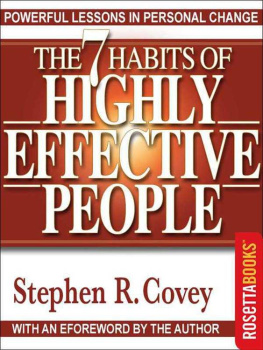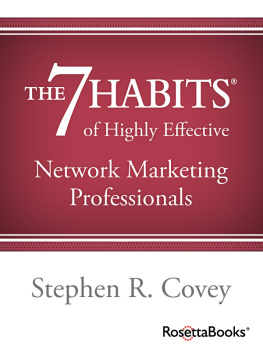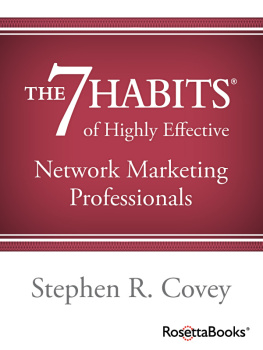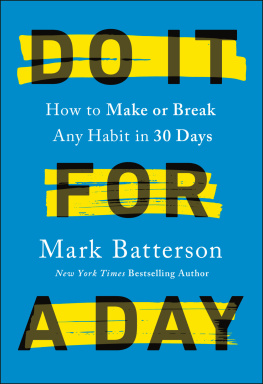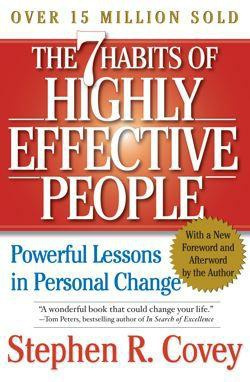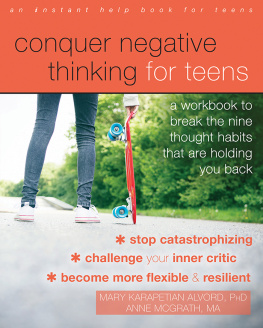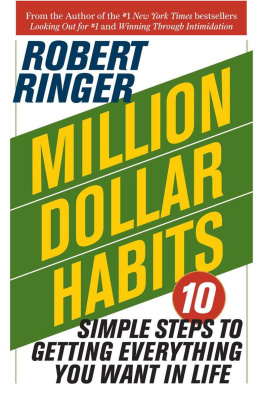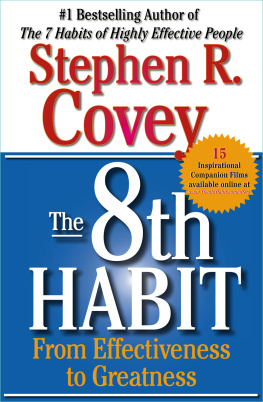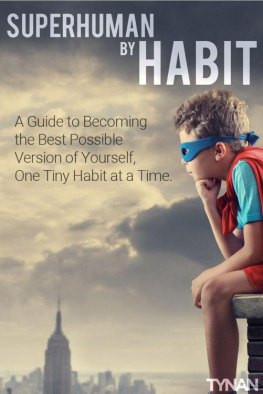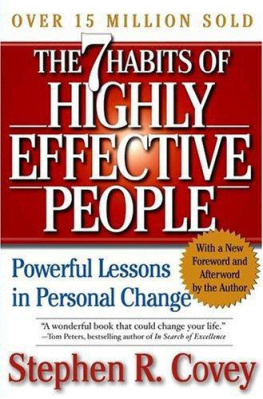Copyright
The 7 Habits of Highly Effective People
Copyright 1989, 2004 by Stephen R. Covey
All rights reserved, including the right of reproduction in whole or in part in any form.
Cover art to the electronic edition copyright 2009 by RosettaBooks, LLC
Excerpt of Little Giddings from Four Quartets, copyright 1943 by T.S. Eliot and renewed 1971 by Esme Valerie Eliot, reprinted by permission of Harcourt Brace Jovanovich, Inc.
First electronic edition published 2009 by RosettaBooks LLC, New York.
ISBN Kindle edition: 9780795309199
ISBN Mobipocket edition: 9780795309205
To my colleagues, Empowered And Empowering A CKNOWLEDGMENTS Interdependence is a higher value than independence.This work is a synergistic product of many minds. It began in the middle seventies as I was reviewing 200 years of success literature as part of a doctoral program. I am grateful for the inspiration and wisdom of many thinkers and for the trans-generational sources and roots of this wisdom.I am also grateful for many students, friends, and colleagues at Brigham Young University and the Covey Leadership Center and for thousands of adults, parents, youth, executives, teachers, and other clients who have tested this material and have given feedback and encouragement. The material and arrangement has slowly evolved and has imbued those who have been sincerely and deeply immersed in it with the conviction that the Seven Habits represent a holistic, integrated approach to personal and interpersonal effectiveness, and that, more than in the individual habits themselves, the real key lies in the relationship among them and in how they are sequenced.For the development and production of the book itself I feel a deep sense of gratitude:to Sandra and to each of our children and their spouses for living lives of integrity and service and for supporting my many travels and involvements outside the home. Its easy to teach principles loved ones live.to my brother John for his constant love, interest, insights and purity of soul.to the happy memory of my father.to my mother for her devotion to her more than 87 living descendants and for her constant demonstrations of love.to my dear friends and colleagues in the business, especially:to Bill Marre, Ron McMillan, and Lex Watterson for feedback, encouragement, editorial suggestions, and production help.to Brad Anderson, who at great personal sacrifice for over a year, developed a Seven Habits video-based development program. Under his leadership this material has been tested and refined and is being implemented by thousands of people across a broad range of organizations. Almost without exception, after initial exposure to this material, our clients desire to make it available to greater numbers of employees, underscoring our confidence that it works.to Bob Thele for helping to create a system for our firm that gave me the peace of mind to enable me to really focus on the book.to David Conley for communicating the value and power of the Seven Habits to hundreds of business organizations so that my colleagues, Blaine Lee, Roice Krueger, Roger Merrill and Al Switzler, and I have the constant opportunity to share ideas in a large variety of settings.to my proactive literary agent Jan Miller, and my can do associate Greg Link and his assistant Stephanni Smith and Raleen Beckham Wahlin for their creative and courageous marketing leadership.to my Simon and Schuster editor Bob Asahina for his professional competence and project leadership, for his many excellent suggestions and for helping me to better understand the difference between writing and speaking.to my earlier devoted assistants Shirley and Heather Smith and to my present assistant Marilyn Andrews for a level of loyalty which is truly uncommon.to our Executive Excellence magazine editor Ken Shelton for his editing of the first manuscript years ago, for helping refine and test the material in several contexts, and for his integrity and sense of quality.to Rebecca Merrill for her invaluable editing and production assistance, for her inner commitment to the material, and for her skill, sensitivity, and carefulness in fulfilling that commitment, and to her husband, Roger, for his wise, synergistic help.and to Kay Swim and her son, Gaylord, for their much appreciated vision which contributed to our organizations rapid growth. F OREWORD Twenty years ago when I wrote this book, I had no idea how the world would change and that people would be able to read The 7 Habits of Highly Effective People in this amazing way on this amazing product.Since then, this book has been called the most influential business book of the century (by The Wall Street Journal ). It stayed on The New York Times best-seller list for five years. A must-read translated into 38 languages, with 20 million copies in print (and is arguably the most pirated business book in the world). Google 7 Habits and youll get more than 12 million hits.Ive been humbled and gratified by the worldwide audience this book has reached. Presidents, prime ministers, and kings read the book, but so do college students, construction workers, and kitchen help. Ive heard from literally thousands of people who say things like this:
- I learned to focus on truly important things, not just urgent things.
- I listen-really listen-to other people for the first time.
- Since I started thinking win-win in a job that was killing me, Ive found a new mission and purpose in my professional life.
How will The 7 Habits impact you? My hope is that you will find new hope, a greater sense of purpose, more peace of mind, and far more rewarding relationships in both your personal and professional life.Stephen R. CoveyDecember 2009FranklinCovey Co. C ONTENTS
Part One
PARADIGMS
and PRINCIPLES
I NSIDE -O UT There is no real excellence in all this world
which can be separated from right living. D AVID S TARR J ORDAN
I n more than 25 years of working with people in business, university, and marriage and family settings, I have come in contact with many individuals who have achieved an incredible degree of outward success, but have found themselves struggling with an inner hunger, a deep need for personal congruency and effectiveness and for healthy, growing relationships with other people.I suspect some of the problems they have shared with me may be familiar to you. Ive set and met my career goals and Im having tremendous professional success. But its cost me my personal and family life. I dont know my wife and children any more. Im not even sure I know myself and whats really important to me. Ive had to ask myselfis it worth it? Ive started a new dietfor the fifth time this year. I know Im overweight, and I really want to change. I read all the new information, I set goals, I get myself all psyched up with a positive mental attitude and tell myself I can do it. But I dont. After a few weeks, I fizzle. I just cant seem to keep a promise I make to myself. Ive taken course after course on effective management training. I expect a lot out of my employees and I work hard to be friendly toward them and to treat them right. But I dont feel any loyalty from them. I think if I were home sick for a day, theyd spend most of their time gabbing at the water fountain. Why cant I train them to be independent and responsibleor find employees who can be? My teenage son is rebellious and on drugs. No matter what I try, he wont listen to me. What can I do? Theres so much to do. And theres never enough time. I feel pressured and hassled all day, every day, seven days a week. Ive attended time management seminars and Ive tried half a dozen different planning systems. Theyve helped some, but I still dont feel Im living the happy, productive, peaceful life I want to live. I want to teach my children the value of work. But to get them to do anything, I have to supervise every move and put up with complaining every step of the way. Its so much easier to do it myself. Why cant children do their work cheerfully and without being reminded? Im busyreally busy. But sometimes I wonder if what Im doing will make any difference in the long run. Id really like to think there was meaning in my life, that somehow things were different because I was here. I see my friends or relatives achieve some degree of success or receive some recognition, and I smile and congratulate them enthusiastically. But inside, Im eating my heart out. Why do I feel this way? I have a forceful personality. I know, in almost any interaction, I can control the outcome. Most of the time, I can even do it by influencing others to come up with the solution I want. I think through each situation and I really feel the ideas I come up with are usually the best for everyone. But I feel uneasy. I always wonder what other people really think of me and my ideas. My marriage has gone flat. We dont fight or anything; we just dont love each other anymore. Weve gone to counseling; weve tried a number of things, but we just cant seem to rekindle the feeling we used to have. These are deep problems, painful problemsproblems that quick fix approaches cant solve.A few years ago, my wife Sandra and I were struggling with this kind of concern. One of our sons was having a very difficult time in school. He was doing poorly academically; he didnt even know how to follow the instructions on the tests, let alone do well on them. Socially he was immature, often embarrassing those closest to him. Athletically, he was small, skinny, and uncoordinated swinging his baseball bat, for example, almost before the ball was even pitched. Others would laugh at him.Sandra and I were consumed with a desire to help him. We felt that if success were important in any area of life, it was supremely important in our role as parents. So we worked on our attitudes and behavior toward him and we tried to work on his. We attempted to psych him up using positive mental attitude techniques. Come on, son! You can do it! We know you can. Put your hands a little higher on the bat and keep your eye on the ball. Dont swing till it gets close to you. And if he did a little better, we would go to great lengths to reinforce him. Thats good, son, keep it up.When others laughed, we reprimanded them. Leave him alone. Get off his back. Hes just learning. And our son would cry and insist that hed never be any good and that he didnt like baseball anyway.Nothing we did seemed to help, and we were really worried. We could see the effect this was having on his self-esteem. We tried to be encouraging and helpful and positive, but after repeated failure, we finally drew back and tried to look at the situation on a different level.At this time in my professional role I was involved in leadership development work with various clients throughout the country. In that capacity I was preparing bimonthly programs on the subject of communication and perception for IBMs Executive Development Program participants.As I researched and prepared these presentations, I became particularly interested in how perceptions are formed, how they govern the way we see, and how the way we see governs how we behave. This led me to a study of expectancy theory and self-fulfilling prophecies or the Pygmalion effect, and to a realization of how deeply imbedded our perceptions are. It taught me that we must look at the lens through which we see the world, as well as at the world we see, and that the lens itself shapes how we interpret the world.As Sandra and I talked about the concepts I was teaching at IBM and about our own situation, we began to realize that what we were doing to help our son was not in harmony with the way we really saw him. When we honestly examined our deepest feelings, we realized that our perception was that he was basically inadequate, somehow behind. No matter how much we worked on our attitude and behavior, our efforts were ineffective because, despite our actions and our words, what we really communicated to him was, You arent capable. You have to be protected.We began to realize that if we wanted to change the situation, we first had to change ourselves. And to change ourselves effectively, we first had to change our perceptions.
Next page
